 The ability to automate a wide range of processes has revolutionized how many industries operate. In everything from administrative and bookkeeping routines to complex manufacturing processes, automated technology has played an increasingly larger role in most companies’ growth and innovation. While several different technological advancements have come together to make automation possible, the realm of electrical thermal management is a unique one. The goal is to properly cool high-performance applications without creating additional energy, maintenance, and space requirements. Heat exchangers’ ability to do exactly that, and to be customized to meet most applications’ unique needs, have made them a significant part of the advancements that have made automation possible. (more…)
The ability to automate a wide range of processes has revolutionized how many industries operate. In everything from administrative and bookkeeping routines to complex manufacturing processes, automated technology has played an increasingly larger role in most companies’ growth and innovation. While several different technological advancements have come together to make automation possible, the realm of electrical thermal management is a unique one. The goal is to properly cool high-performance applications without creating additional energy, maintenance, and space requirements. Heat exchangers’ ability to do exactly that, and to be customized to meet most applications’ unique needs, have made them a significant part of the advancements that have made automation possible. (more…)
When Electronics Are Designed with Custom Thermal Solutions
 As modern thermal management solutions have advanced, technology designers have enjoyed a greater level of freedom in how they design new applications and products. For example, the introduction of heat exchangers gave them an option to include consistently reliable electrical cooling without the need for solutions such as air conditioning or air compressors. This opened up the possibility of creating smaller yet more powerful designs that didn’t require as much energy or maintenance. Today, heat exchangers and other custom thermal solutions have allowed for even greater versatility, providing significant benefits for technology designers and the companies that rely on their applications. (more…)
As modern thermal management solutions have advanced, technology designers have enjoyed a greater level of freedom in how they design new applications and products. For example, the introduction of heat exchangers gave them an option to include consistently reliable electrical cooling without the need for solutions such as air conditioning or air compressors. This opened up the possibility of creating smaller yet more powerful designs that didn’t require as much energy or maintenance. Today, heat exchangers and other custom thermal solutions have allowed for even greater versatility, providing significant benefits for technology designers and the companies that rely on their applications. (more…)
A Better Understanding of Custom Thermal Management
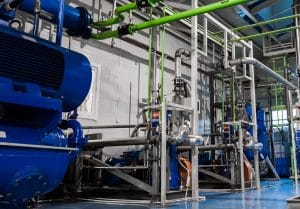 The rate at which electrical and other thermal management technologies have advanced over the decades has been a significant benefit to companies in most industries. In some cases, company leaders may not fully understand the innovative techniques that heat exchangers utilize to prevent overheating, yet they easily recognize the advantages that they provide their overall operations. In other cases, it’s because of that lack of understanding that companies fail to make the investment necessary to streamline their thermal management processes. Today, we examine a few ways in which heat exchangers benefit the companies that rely on them, and why increasingly more organizations are relying on them and similar custom thermal solutions. (more…)
The rate at which electrical and other thermal management technologies have advanced over the decades has been a significant benefit to companies in most industries. In some cases, company leaders may not fully understand the innovative techniques that heat exchangers utilize to prevent overheating, yet they easily recognize the advantages that they provide their overall operations. In other cases, it’s because of that lack of understanding that companies fail to make the investment necessary to streamline their thermal management processes. Today, we examine a few ways in which heat exchangers benefit the companies that rely on them, and why increasingly more organizations are relying on them and similar custom thermal solutions. (more…)
Heat Exchanger-Powered Wastewater Treatment
 In many different industries, wastewater is an unfortunate but unavoidable byproduct of certain essential processes. This water has to be released into the environment, or repurposed for other industrial uses and then released, at some point after production. However, before it can be, companies must institute effective wastewater treatment processes to remove the harmful toxins, chemicals, and other substances that the water carries. In many cases, the use of modern heat exchangers helps make this process much more effective, cost-efficient, and manageable, helping companies maintain optimal wastewater treatment processes at minimal costs. (more…)
In many different industries, wastewater is an unfortunate but unavoidable byproduct of certain essential processes. This water has to be released into the environment, or repurposed for other industrial uses and then released, at some point after production. However, before it can be, companies must institute effective wastewater treatment processes to remove the harmful toxins, chemicals, and other substances that the water carries. In many cases, the use of modern heat exchangers helps make this process much more effective, cost-efficient, and manageable, helping companies maintain optimal wastewater treatment processes at minimal costs. (more…)
Creating Below-Ambient Cooling without Chilled Air
 For most common systems, the maximum operating temperature of a given application is much higher than the ambient temperature around it. Therefore, for such applications, there is no pressing need to have to chill the inside of electrical enclosures to prevent them from overheating. That’s why heat exchangers first became a more popular alternative. Instead of chilling air, the innovative thermal management solutions created a way to prevent overheating by simply removing the heat, keeping the temperature inside of electrical enclosures at just above the ambient temperatures outside of them. However, the same principles of heat transfer can also be applied to create below-ambient cooling solutions that still don’t rely on air conditioning and chilling. (more…)
For most common systems, the maximum operating temperature of a given application is much higher than the ambient temperature around it. Therefore, for such applications, there is no pressing need to have to chill the inside of electrical enclosures to prevent them from overheating. That’s why heat exchangers first became a more popular alternative. Instead of chilling air, the innovative thermal management solutions created a way to prevent overheating by simply removing the heat, keeping the temperature inside of electrical enclosures at just above the ambient temperatures outside of them. However, the same principles of heat transfer can also be applied to create below-ambient cooling solutions that still don’t rely on air conditioning and chilling. (more…)
Translating Heat Exchanger Tech into Machine Tool Cooling
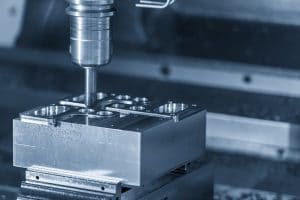 Heat exchanger technology has proven to be one of the biggest innovations in electrical thermal management over the last few decades. From it, several other innovative, custom thermal solutions have also been developed and become as popular and beneficial as more conventional heat exchangers. For example, in the molding industry, the process of cooling molds and facilitating faster, more efficient machine tool cooling is an essential advantage. With the implementation of custom thermal pins, which are specialized heat exchangers designed specifically for molding equipment, companies can achieve these and many other advantages safely and with minimal costs. (more…)
Heat exchanger technology has proven to be one of the biggest innovations in electrical thermal management over the last few decades. From it, several other innovative, custom thermal solutions have also been developed and become as popular and beneficial as more conventional heat exchangers. For example, in the molding industry, the process of cooling molds and facilitating faster, more efficient machine tool cooling is an essential advantage. With the implementation of custom thermal pins, which are specialized heat exchangers designed specifically for molding equipment, companies can achieve these and many other advantages safely and with minimal costs. (more…)
Are Heat Exchangers as Effective in the Oil & Gas Industry?
 Some technological concepts transcend industries and become staples of operations in virtually all of them. For decades, heat exchangers and other custom thermal solutions have been just a concept. Their advanced, highly efficient thermal management methods have benefited companies in fields ranging from manufacturing and production to medical and other high-performance technologies, and much more. However, some industries, have been slower to adopt such solutions. For those that operate in particularly hazardous locations, such as the oil and gas industry, such solutions have only relatively recently been designed to maximize both efficiency and safety in such conditions. (more…)
Some technological concepts transcend industries and become staples of operations in virtually all of them. For decades, heat exchangers and other custom thermal solutions have been just a concept. Their advanced, highly efficient thermal management methods have benefited companies in fields ranging from manufacturing and production to medical and other high-performance technologies, and much more. However, some industries, have been slower to adopt such solutions. For those that operate in particularly hazardous locations, such as the oil and gas industry, such solutions have only relatively recently been designed to maximize both efficiency and safety in such conditions. (more…)
The Energy Efficient Way to Cool Electrical Control Panels
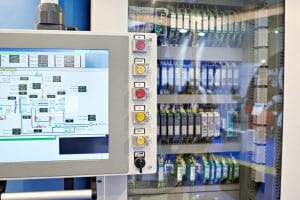 These days, thermal management can mean a wide range of things for companies in various industries. However, the most common and frequent thermal management need is the need to keep electrical enclosures, such as control panels, properly cooled and protected from outside contaminants. In this area, heat exchangers have long been a preferred thermal management solution. Their ability to rapidly and continuously transfer waste heat, often within a closed-loop system, and to operate with minimal amounts of energy have made modern heat exchangers a much more energy efficient way to cool electrical control panels in most industries. (more…)
These days, thermal management can mean a wide range of things for companies in various industries. However, the most common and frequent thermal management need is the need to keep electrical enclosures, such as control panels, properly cooled and protected from outside contaminants. In this area, heat exchangers have long been a preferred thermal management solution. Their ability to rapidly and continuously transfer waste heat, often within a closed-loop system, and to operate with minimal amounts of energy have made modern heat exchangers a much more energy efficient way to cool electrical control panels in most industries. (more…)
Challenges that Heat Exchangers Make a Non-Issue
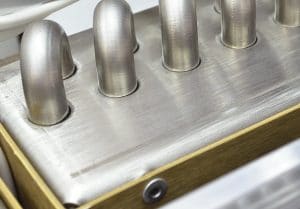 No matter how advanced technology becomes, it always has to account for the waste heat that its electrical components generate. Innovative setups can help reduce the amount of heat they produce, but nevertheless, applications still require effective solutions for dealing with the heat that is emitted. Finding the right solutions can sometimes be challenging, especially when application designers or end users rely on traditionally cumbersome thermal management solutions. With modern, custom thermal solutions, such as heat exchangers, many of the challenges of efficient thermal management are much less challenging, and therefore, much easier to overcome. (more…)
No matter how advanced technology becomes, it always has to account for the waste heat that its electrical components generate. Innovative setups can help reduce the amount of heat they produce, but nevertheless, applications still require effective solutions for dealing with the heat that is emitted. Finding the right solutions can sometimes be challenging, especially when application designers or end users rely on traditionally cumbersome thermal management solutions. With modern, custom thermal solutions, such as heat exchangers, many of the challenges of efficient thermal management are much less challenging, and therefore, much easier to overcome. (more…)
3 Simple but Highly Effective Heat Transfer Methods
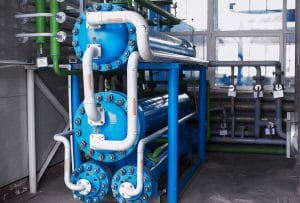 For companies where modern heat exchangers are the main thermal management solution, the biggest difference between the advanced solutions and more traditional cooling methods is the cost associated with each. Compared to things like air conditioners and air compressors, heat exchangers can operate longer and more reliably, all while using a fraction of the energy and requiring minimal maintenance to do so. However, the biggest difference – the one that all others stem from – is the manner in which heat exchangers approach thermal management. Rather than chilling air to overwhelm electrical waste heat, the more streamlined solutions operate on more natural and easily manageable methods of transferring heat. (more…)
For companies where modern heat exchangers are the main thermal management solution, the biggest difference between the advanced solutions and more traditional cooling methods is the cost associated with each. Compared to things like air conditioners and air compressors, heat exchangers can operate longer and more reliably, all while using a fraction of the energy and requiring minimal maintenance to do so. However, the biggest difference – the one that all others stem from – is the manner in which heat exchangers approach thermal management. Rather than chilling air to overwhelm electrical waste heat, the more streamlined solutions operate on more natural and easily manageable methods of transferring heat. (more…)







